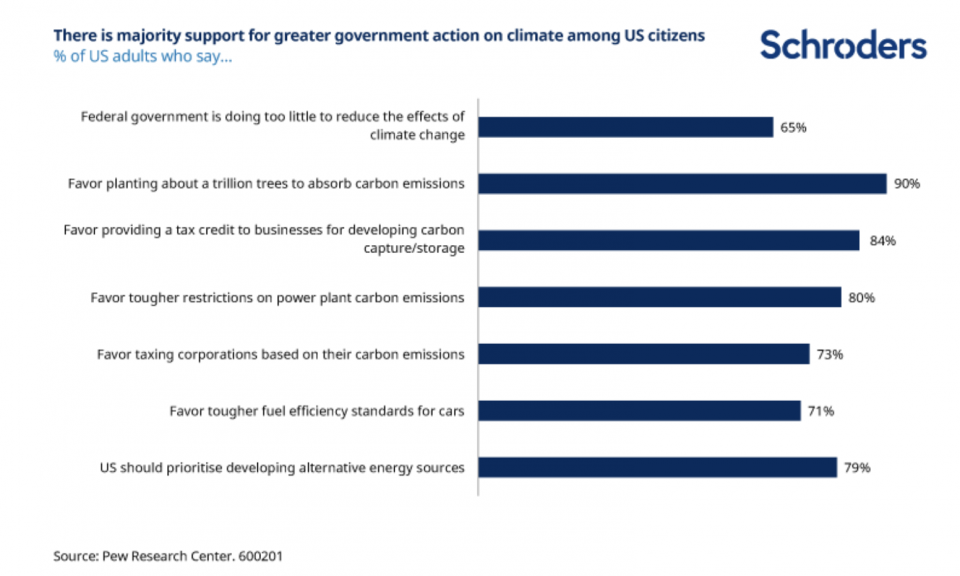
What next for Biden’s climate and social agenda?

Joe Biden ran on one of the most progressive platforms the US has ever seen, with climate ambition at its heart. His victory will result in a sea-change in US climate ambition. That said, the narrow margin of victory will pose challenges for the more ambitious elements of his agenda.
Below we assess the policy options under a narrowly Democratic Congress, as well as the avenues that Biden can pursue outside of the legislative arena, including through executive authority and setting priorities at federal agencies. We should also expect to see action stepped up at the state level.
Will Biden have to compromise the most ambitious elements of his climate agenda?
The outcome of the Georgia runoff will give Democrats effective control of the Senate: both parties will hold 50 seats, with Vice President Kamala Harris’s vote acting as the tie breaker. The party also retains a slim majority in the House of Representatives, meaning that Biden will preside over the first Democratic Congress in over a decade.
This is good news for Biden’s legislative agenda, but the narrow victory will mean that much of it will need to be watered down in order to pass – he will be reliant on votes from Democrats in conservative-leaning districts.
That said, broad-based support for climate action among US citizens will leave some scope for bipartisan consensus. A more bipartisan approach may also appeal to the new president as he seeks to bring a divided country together, particularly in light of the Capitol riots at the start of the year.

In particular, Biden’s proposed $2 trillion climate plan may end up coming in closer to half that amount. That said, we expect the focus to remain on green solutions including renewable energy, alternative transport, sustainable real estate, and clean tech. See our October report for more detail.
On the social side, Biden’s federal minimum wage proposal (to increase it from $7.25 per hour to $15 per hour) seems unlikely to secure support unless it is lowered substantially, though he may be able to make some progress on enhancing social safety nets.
On healthcare, proposals to cap drug price rises should prove relatively non-controversial, while a public health insurance option would be much more difficult. We may also see discussion of greater regulation for big tech in terms of content liability and data privacy.
Discover more from Schroders:
– Learn: Outlooks 2021: What can we expect in the coming year?
– Read: What next for Biden’s climate change policies?
– Watch: How climate change could affect your investment returns?
How will Biden use his executive power?
Perhaps of greatest symbolic importance will be the US re-joining the Paris Agreement on climate change, which Biden has pledged to do on his first day in office. This act alone will serve as a powerful indication of the growing global consensus behind the decarbonisation agenda.
At a more practical level, there are a number of measures Biden can implement across the power, oil & gas and autos sectors through executive authority. As president, he will have power to reverse a number of rollbacks introduced under the Trump administration.
These include tighter regulations on emissions, particularly on methane and in the oil & gas sector, and on limiting those from the power sector. More aggressive fuel economy standards in the autos sector are also likely.
Biden will also have some discretion to direct federal procurement toward clean ends, to suspend oil & gas leasing on federal land and increase the regulatory burden on existing leases.
Biden to take back control of the agenda at federal agencies
As president, Biden can influence priorities at federal agencies such as the Environmental Protection Agency (EPA) and the Securities Exchange Commission (SEC). His appointments so far signal a concerted government-wide response to climate change; candidates with significant climate expertise and ambition are set to enter almost every federal agency.
This includes Janet Yellen – a long-time supporter of climate action and proponent of carbon pricing – and her appointment as Treasury Secretary. Together with the Federal Reserve’s recent move to join the Network for Greening the Financial System, Yellen would have a strong mandate to incorporate climate risk into core oversight responsibilities across financial regulators.
States continue to take the lead
State-level policies have been a key driver of US climate action in the absence of federal ambition, with capacity to set greenhouse gas (GHG) reduction and renewables targets. In response to Trump’s withdrawal from the Paris Agreement, 24 states (plus Puerto Rico) came together to form the US Climate Alliance and have set ambitious emissions reduction and clean electricity targets.
Other initiatives include the Regional Greenhouse Gas Initiative and the Transportation and Climate Initiative. We expect this state-level leadership to continue and strengthen under Biden. He has discretion to grant states even greater independence – for example through granting waivers for states to implement zero emissions vehicle (ZEV) programmes as in California.
Conclusion: change is coming
While the narrow Democratic victory may hinder Biden’s ability to pass the more ambitious aspects of his climate and social agenda, we continue to expect a strong focus on climate action from the incoming president. The proposed $2 trillion climate package may no longer be feasible at those levels, but we expect his prioritising of green stimulus to benefit alternative energy, sustainable transport and real estate, and clean tech. Moreover, Biden may make progress in the autos, power and energy sectors through executive order; may set priorities at federal agencies; and may grant states even greater independence to pursue ambitious climate strategies.
Though largely symbolic, the country’s re-commitment to the Paris Agreement will be meaningful nonetheless. Together with net-zero ambitions from China, the European Union and Japan (to name just a few), the global long-term direction of travel is clear.
- For more on sustainable investors visit Schroders’ sustainability hub.
Important Information: This communication is marketing material. The views and opinions contained herein are those of the author(s) on this page, and may not necessarily represent views expressed or reflected in other Schroders communications, strategies or funds. This material is intended to be for information purposes only and is not intended as promotional material in any respect. The material is not intended as an offer or solicitation for the purchase or sale of any financial instrument. It is not intended to provide and should not be relied on for accounting, legal or tax advice, or investment recommendations. Reliance should not be placed on the views and information in this document when taking individual investment and/or strategic decisions. Past performance is not a reliable indicator of future results. The value of an investment can go down as well as up and is not guaranteed. All investments involve risks including the risk of possible loss of principal. Information herein is believed to be reliable but Schroders does not warrant its completeness or accuracy. Some information quoted was obtained from external sources we consider to be reliable. No responsibility can be accepted for errors of fact obtained from third parties, and this data may change with market conditions. This does not exclude any duty or liability that Schroders has to its customers under any regulatory system. Regions/ sectors shown for illustrative purposes only and should not be viewed as a recommendation to buy/sell. The opinions in this material include some forecasted views. We believe we are basing our expectations and beliefs on reasonable assumptions within the bounds of what we currently know. However, there is no guarantee than any forecasts or opinions will be realised. These views and opinions may change. To the extent that you are in North America, this content is issued by Schroder Investment Management North America Inc., an indirect wholly owned subsidiary of Schroders plc and SEC registered adviser providing asset management products and services to clients in the US and Canada. For all other users, this content is issued by Schroder Investment Management Limited, 1 London Wall Place, London EC2Y 5AU. Registered No. 1893220 England. Authorised and regulated by the Financial Conduct Authority.
